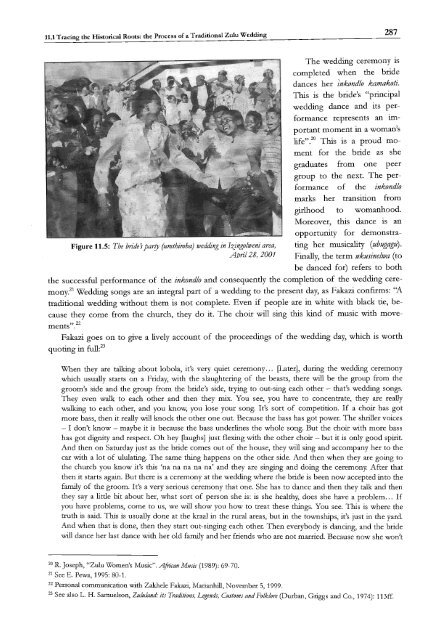South African Choral Music (Amakwaya): Song, Contest and the ...
South African Choral Music (Amakwaya): Song, Contest and the ...
South African Choral Music (Amakwaya): Song, Contest and the ...
You also want an ePaper? Increase the reach of your titles
YUMPU automatically turns print PDFs into web optimized ePapers that Google loves.
11.1 Tracing <strong>the</strong> Historical Roots: <strong>the</strong> Process of a Traditional Zulu Wedding<br />
Figure 11.5: The bride's parry (umthimba) wedding in Izingolweni area,<br />
April28, 2001<br />
287<br />
The wedding ceremony is<br />
completed when <strong>the</strong> bride<br />
dances her znkondlo kamakoti.<br />
This is <strong>the</strong> bride's "principal<br />
wedding dance <strong>and</strong> its performance<br />
represents an important<br />
moment in a woman's<br />
life".20 This is a proud mo<br />
ment for <strong>the</strong> bride as she<br />
graduates from one peer<br />
group to <strong>the</strong> next. The performance<br />
of <strong>the</strong> inkondlo<br />
marks her transition from<br />
girlhood to womanhood.<br />
Moreover, this dance is an<br />
opportunity for demonstrating<br />
her musicality (ubugagu).<br />
Finally, <strong>the</strong> term ukusinelwa (to<br />
be danced for) refers to both<br />
<strong>the</strong> successful performance of <strong>the</strong> inkondlo <strong>and</strong> consequently <strong>the</strong> completion of <strong>the</strong> wedding ceremony.21<br />
Wedding songs are an integral part of a wedding to <strong>the</strong> present day, as Fakazi confIrms: ''A<br />
traditional wedding without <strong>the</strong>m is not complete. Even if people are in white with black tie, because<br />
<strong>the</strong>y come from <strong>the</strong> church, <strong>the</strong>y do it. The choir will sing this kind of music with movements".22<br />
Fakazi goes on to give a lively account of <strong>the</strong> proceedings of <strong>the</strong> wedding day, which is worth<br />
. . full 23<br />
quottng ill :<br />
When <strong>the</strong>y are talking about lobola, it's very quiet ceremony... [Later], during <strong>the</strong> wedding ceremony<br />
which usually starts on a Friday, with <strong>the</strong> slaughtering of <strong>the</strong> beasts, <strong>the</strong>re will be <strong>the</strong> group from <strong>the</strong><br />
groom's side <strong>and</strong> <strong>the</strong> group from <strong>the</strong> bride's side, trying to out-sing each o<strong>the</strong>r - that's wedding songs.<br />
They even walk to each o<strong>the</strong>r <strong>and</strong> <strong>the</strong>n <strong>the</strong>y mix. You see, you have to concentrate, <strong>the</strong>y are really<br />
walking to each o<strong>the</strong>r, <strong>and</strong> you knO\v, you lose your song. It's sort of competition. If a choir has got<br />
more bass, <strong>the</strong>n it really will knock <strong>the</strong> o<strong>the</strong>r one out. Because <strong>the</strong> bass has got power. The shriller voices<br />
- I don't know - maybe it is because <strong>the</strong> bass underlines <strong>the</strong> whole song. But <strong>the</strong> choir with more bass<br />
has got dignity <strong>and</strong> respect. Oh hey [laughs] just flexing with <strong>the</strong> o<strong>the</strong>r choir - but it is only good spirit.<br />
And <strong>the</strong>n on Saturday just as <strong>the</strong> bride comes out of <strong>the</strong> house, <strong>the</strong>y will sing <strong>and</strong> accompany her to <strong>the</strong><br />
car with a lot of ululating. The same thing happens on <strong>the</strong> o<strong>the</strong>r side. And <strong>the</strong>n when <strong>the</strong>y are going to<br />
<strong>the</strong> church you know it's this 'na na na na na' <strong>and</strong> <strong>the</strong>y are singing <strong>and</strong> doing <strong>the</strong> ceremony. After that<br />
<strong>the</strong>n it starts again. But <strong>the</strong>re is a ceremony at <strong>the</strong> wedding where <strong>the</strong> bride is been now accepted into <strong>the</strong><br />
family of <strong>the</strong> groom. It's a very serious ceremony that one. She has to dance <strong>and</strong> <strong>the</strong>n <strong>the</strong>y talk <strong>and</strong> <strong>the</strong>n<br />
<strong>the</strong>y say a little bit about her, what sort of person she is: is she healthy, does she have a problem... If<br />
you have problems, come to us, we will show you how to treat <strong>the</strong>se things. You see. This is where <strong>the</strong><br />
truth is said. This is usually done at <strong>the</strong> kraal in <strong>the</strong> rural areas, but in <strong>the</strong> townships, it's just in <strong>the</strong> yard.<br />
And when that is done, <strong>the</strong>n <strong>the</strong>y start out-singing each o<strong>the</strong>r. Then everybody is dancing, <strong>and</strong> <strong>the</strong> bride<br />
will dance her last dance with her old family <strong>and</strong> her friends who are not married. Because now she won't<br />
20 R. Joseph, "Zulu Women's <strong>Music</strong>". <strong>African</strong> <strong>Music</strong> (1989): 69-70.<br />
21 See E. Pewa, 1995: 80-1.<br />
22 Personal communication with Zakhele Fakazi, Marianhill, November 5,1999.<br />
23 See also L. H. Samuelson, Zulul<strong>and</strong>: its Traditions, Legends, Customs <strong>and</strong> Folklore (Durban, Griggs <strong>and</strong> Co., 1974): 113££

















